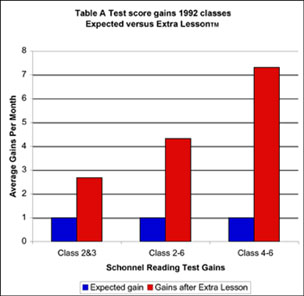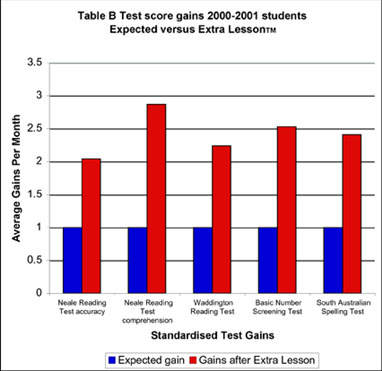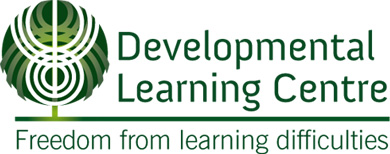For further information or to make an appointment contact us.
Extra Lesson™
Research into the effects of Extra Lesson™ on 15 students with learning difficulties showed that students improved on average by 22 months in reading accuracy and 23 months in reading comprehension after 7 months in the program. (M.Ed Thesis, M. Judd 1997.) ADD and ADHD diagnosed Extra Lesson™ students have shown decreases in behaviours such as inattention, hyperactivity and impulsivity and all made substantial academic gains after 20 weeks. (M.Ed. Thesis, L. Craig 2001.)
Results in Extra Lesson™ at the Orana School, ACT, Australia 2000 -2001
Explanatory notes
Table A shows the results for reading, spelling and numeracy gains for 25 students who have either recently completed the program or are currently part way through the program.

Results interpretation
Literacy and Numeracy Learning Outcomes
- All these results are more than twice the rate of gain than would normally be expected with maturation. These results are very pleasing, leading us to conclude that the Extra Lesson Program has significantly improved students’ literacy and numeracy performance, and it is an efficacious method of enhancing learning outcomes. 14 students completed Neale Analysis of Reading Tests, gaining at an average rate of 2.04 months per month in accuracy, and 2.87 months per month in comprehension. 14 students completed Waddington Diagnostic Reading Tests, gaining at an average rate of 2.24 months per month. The South Australian Spelling Test was completed by 13 students, who averaged a rate of gain of 2.41 months per month in spelling. The Basic Number Screening Test was completed by 14 students, with an average rate of gain of 2.53 months per month
Effective Outcomes
- Organisational skills
Teachers and parents have consistently reported that children are better able to organise themselves in setting about and completing tasks both at home and at school. There have been comments such as: O was able to complete his science assignment from start to finish without giving up several times as he would have last year, P isn't so dreamy any more. - Attention and on task behaviour
Several children who would scribble over their work in their books have stopped doing this and they now complete their work. A parent commented Y seems so much more mature now. Teachers have commented that children no longer need the constant teacher direction required before the program. In Extra Lesson™ sessions it was noted that several children diagnosed with ADHD could come in and complete the required tasks without using the distracting behaviours previously used in a lesson e.g. constant talking and moving around the room. - Improvements in physical coordination
Parents and teachers reported improvements in many areas, including bike riding - K is now able to ride her bike around the basketball court, ball bouncing - M can now bounce a ball 200 times, not just two times, and writing a Class 1 child diagnosed with dyspraxia by CHADS is now able to write. Most handwriting samples collected showed improvements, as did knitting - I no longer have to send his knitting home to be finished, shoe lace tying and general running and playing in the playground. - Self-esteem
Improvements in self-esteem in a large number of children were evident in significant decreases in behaviour such as hiding under desks, bed wetting and soiling pants, avoiding classroom singing and movement activities, crying and complaining when separating from parents in the morning, and avoiding attending school. Some students were able to form friendships for the first time, and were invited more often to birthday parties. Psychosomatic symptoms such as tummy pains, and headaches were decreased in some children. - Self-confidence and risk-taking
There were several comments such as: R no longer comes to me at the board all the time to ask for confirmation of what needs to be done. She is much more confident at talking in front of the class; G can now participate more fully as she can actually do more of the reading and writing, and D no longer says, "I'm not very good at this you know," when writing and reading. - Engagement in literacy and numeracy activities
Teachers made observations such as; H is now happy to take home his readers; N wrote a very long word in his book (catastrophe) from the board without me even asking him to; D loves reading now; J's maths has really taken off, and I was very worried about D's spelling, but it all seems to be happening now, and she's not so worried about being behind.
Results in Extra Lesson™ at the Orana School, ACT, Australia 1992
Explanatory notes
The 1992 results, shown in table B, show a range of improvements after participating in the Extra Lesson program on the Schonell reading test. The average gain was 4.32 months improvement per month for all the students from Class 2 to 6. (Extra Lesson was offered to some older children at this time.) This is a much larger than expected rate of improvement.

When only Class 2 and 3 are considered (as the program is now only offered to Class 1,2 and 3 children), the range is from 0.37 to 5.5 months improvements per month, and the average rate is 2.68 months. This is comparable with results obtained in 2000 and 2001, which are shown in tables C and D.
For the Class 4 to 6 students, the range was from 3 to 12 months improvement per month, and the average was 7.31 months. This is consistent with other older students who have participated privately in the program. Both these results are also much greater than would be expected for the average student.
